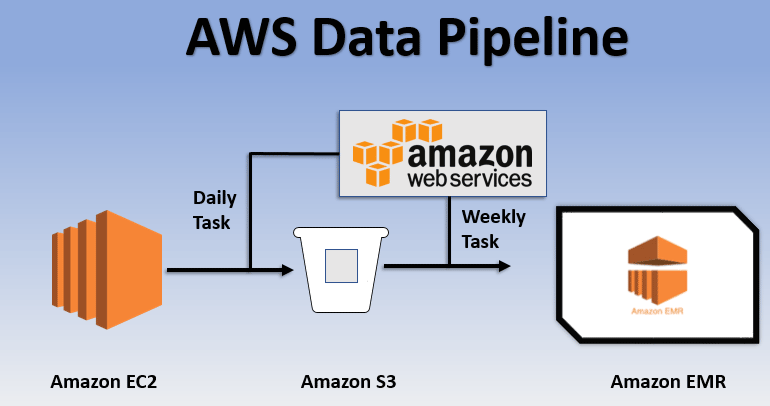AWS Data Storage Solutions – To effectively manage this data, organizations require robust and reliable AWS data storage solutions. Amazon Web Services (AWS) offers a comprehensive suite of tools and services tailored for big data storage, management, and processing. This article explores various AWS data storage solutions, their features, and how they can benefit businesses in leveraging big data.
Table of Contents
ToggleUnderstanding AWS Data Storage Solutions
AWS provides a range of data storage solutions designed to cater to different needs, from scalable object storage to high-performance databases. The choice of the right storage solution can greatly influence the efficiency of data processing, retrieval, and analytics. Let’s dive into some of the key AWS storage services.
Amazon S3: The Cornerstone of Cloud Storage
Amazon S3 (Simple Storage Service) is one of the most popular AWS data storage solutions. It offers scalable, high-speed, and low-cost storage for data. With Amazon S3, businesses can store virtually unlimited amounts of data and retrieve it anytime from anywhere on the web.
Key Features of Amazon S3
- Scalability: Amazon S3 allows users to scale storage according to their needs without any upfront investment.
- Durability and Availability: With an impressive 99.999999999% durability, Amazon S3 automatically replicates data across multiple facilities, ensuring data is safe and accessible.
- Cost-Effectiveness: Pay-as-you-go pricing ensures that businesses only pay for what they use, making it an affordable option for startups and enterprises alike.
Amazon RDS: Managed Relational Database Service
Amazon RDS (Relational Database Service) simplifies the process of setting up, operating, and scaling a relational database in the cloud. It supports various database engines, including MySQL, PostgreSQL, MariaDB, Oracle, and SQL Server.
Benefits of Using Amazon RDS
- Easy Management: AWS handles routine database tasks such as backups, software patching, and scaling, allowing developers to focus on application development.
- High Availability: With Multi-AZ deployments, Amazon RDS ensures that your database remains available even in the event of a failure.
- Automated Backups: Amazon RDS automatically backs up your database, which can be restored at any point in time.
Amazon DynamoDB: NoSQL Database for High Performance
For applications that require low-latency responses and high throughput, Amazon DynamoDB is the go-to solution. This fully managed NoSQL database service supports key-value and document data structures.
Why Choose DynamoDB?
- Performance at Scale: DynamoDB automatically scales up and down to adjust for capacity and maintain performance.
- Global Tables: This feature allows developers to deploy a multi-region, fully replicated database for high availability and disaster recovery.
- Security: DynamoDB integrates with AWS Identity and Access Management (IAM) for enhanced security, allowing fine-grained access control.
Data Lifecycle Management in AWS
AWS provides tools to manage the lifecycle of data effectively. This includes data ingestion, storage, processing, and deletion, ensuring that data management practices align with compliance and business requirements.
Data Ingestion and Transfer
Data ingestion involves moving data from various sources to your storage solutions. AWS offers multiple services for this purpose:
- AWS Snowball: A physical device to transfer large amounts of data into AWS.
- AWS DataSync: A service that automates moving data between on-premises storage and AWS storage services.
Data Organization and Retrieval
Once data is ingested into AWS, it is crucial to organize it for easy retrieval and analysis. Amazon S3 provides features like S3 Object Tags and S3 Inventory to help with data organization.
Data Archiving and Deletion
Data that is no longer needed can incur unnecessary costs. AWS offers various storage classes in Amazon S3, such as S3 Glacier and S3 Intelligent-Tiering, which can help manage archiving and lifecycle policies effectively.
Ensuring Data Security with AWS
When dealing with big data, security is a top priority. AWS employs various measures to safeguard data at rest and in transit.
Encryption
AWS provides multiple encryption options, allowing users to encrypt their data using AWS Key Management Service (KMS) or customer-managed keys. This ensures that data is secure and compliant with regulatory requirements.
Access Control
AWS Identity and Access Management (IAM) allows businesses to define user roles and permissions, ensuring that only authorized personnel have access to sensitive data.
Monitoring and Logging
AWS CloudTrail and Amazon CloudWatch provide monitoring and logging capabilities, enabling businesses to keep track of who accessed their data and when.
Use Cases for AWS Data Storage Solutions
Different industries leverage AWS data storage solutions in various ways. Here are a few notable use cases:
E-commerce
E-commerce platforms can use Amazon S3 for storing product images, videos, and customer data. They can utilize Amazon RDS to manage transactional data while employing DynamoDB to handle user sessions and shopping cart data.
Healthcare
Healthcare organizations can utilize AWS to securely store and analyze patient records. Amazon S3 can store large datasets for research, while Amazon RDS can manage relational data for patient management systems.
Media and Entertainment
Streaming services can leverage AWS data storage solutions to store and distribute media content. They can use Amazon S3 for storing video files and Amazon CloudFront as a content delivery network to distribute content globally.
The Future of AWS Data Storage Solutions
As businesses continue to generate vast amounts of data, the demand for efficient AWS data storage solutions will only increase. AWS is continuously innovating and expanding its service offerings to meet these needs.
Emerging Technologies
The rise of AI and machine learning is changing how data is processed and analyzed. AWS is integrating these technologies into its services, enabling businesses to extract actionable insights from their data more efficiently.
Cost Management
With the introduction of services like AWS Budgets and AWS Cost Explorer, businesses can manage their costs effectively, ensuring they get the most value from their AWS investments.
Conclusion
AWS data storage solutions provide businesses with the necessary tools to manage, store, and analyze their data efficiently. From scalable options like Amazon S3 to high-performance databases like DynamoDB, AWS offers a variety of services that cater to different needs. By leveraging these solutions, organizations can unlock the full potential of their big data, driving innovation and growth.
For more in-depth information on AWS services, you can visit the official AWS website.
By implementing these AWS data storage solutions, businesses can effectively manage their data lifecycle, enhance security, and pave the way for future growth in a data-driven world.




